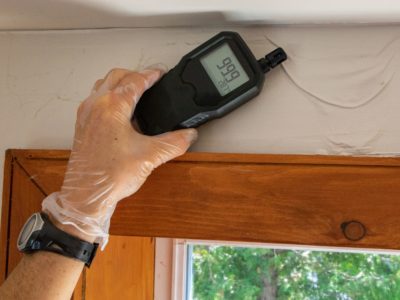First-time landlords are much more prevalent in the Northern regions of England, taking advantage of lower property prices, more affordable rental coverage, lower value mortgage loan requirements and stronger rental yield, in order to make their first forays into property investment.
According to buy-to-let specialist lender, Fleet Mortgages’ latest quarterly Buy-to-Let Barometer for Q4 2024, 25% of all mortgage applications received from landlord borrowers in the North East of England, came from first-time landlords, while the second highest regional figure – 13% – was in Yorkshire & Humberside.
This compared to just 4% in the South West of England, where – as in most other regions – the highest percentage of landlords applying for mortgages already owned a portfolio of between six and 14 properties.
Across England & Wales, applications received from landlords with six to 14 buy-to-let properties had increased from 30% in Q3 2024 to 34% in Q4, while overall first-time landlord applications had also risen from 10% to 11%, over the same period.
The lender said the higher number of first-time landlords in northern regions was likely due to a number of factors including lower property prices, more affordable monthly rents – the North East has the most affordable rental stock nationally with an average monthly rent of £706pcm – and the fact landlords were also borrowing the lowest loan amount, on average £77k per mortgage.
It also outlined how Yorkshire & Humberside and the North West also shared many of the same characteristics as the North East, with lower average loan sizes required and lower monthly rental amounts on average.
These northern regions also delivered the best average rental yield – a further incentive for new landlords according to Fleet – with the average rental yield in the North East currently at 9.3%, in Yorkshire & Humberside at 8.6%, and in the North West at 8.3%.
This was compared to Southern regions which, due to higher property prices/mortgage loan amounts/monthly rent, delivered lower average annual yields – Greater London at 5.8%, East Anglia at 6.3% and the South East at 6.4%.
The Fleet Mortgages Quarterly Rental Barometer provides a regional snapshot of all areas of England and Wales in which Fleet lends and highlights the rental yield changes that have occurred in each of those regions. In this iteration, the yearly comparison is between Q4 2023 and Q4 2024.
| Average Rental Yields | y/y change | ||
| Region | 2023 Q4 | 2024 Q4 | |
| North East | 8.0% | 9.3% | 1.3% |
| Yorkshire and Humberside | 7.6% | 8.6% | 1.0% |
| North West | 8.0% | 8.3% | 0.3% |
| Wales | 7.7% | 8.2% | 0.5% |
| East Midlands | 6.5% | 7.7% | 1.2% |
| South West | 6.3% | 6.9% | 0.6% |
| West Midlands | 7.1% | 6.6% | -0.5% |
| South East | 5.8% | 6.4% | 0.6% |
| East Anglia | 6.0% | 6.3% | 0.3% |
| Greater London | 5.6% | 5.8% | 0.2% |
| England & Wales (Total) | 6.8% | 7.4% | 0.6% |
The lender also highlighted other Rental Barometer regional differences including the number of landlords who now borrow through a limited company vehicle as opposed to in their own name. In Yorkshire & Humberside, 91% of all applications received were from limited company landlord borrowers, compared to just 60% in the South West.
Also the split between purchase and remortgage applications was much more equal in certain regions compared to others. There has been an ongoing narrative suggesting landlords are currently less inclined to purchase buy-to-let properties because of the rising costs for them.
However, Fleet data reveals that in regions such as the North East, East Anglia and Greater London, purchase applications are almost on a par with remortgaging. In the Yorkshire & Humberside region, purchase applications actually exceeded remortgage – 60% compared to 40%. This is not the case in other regions, for example, in Wales 71% of all applications during the quarter were for remortgages, compared to just 29% for purchases.
Fleet said it was positive to see a much more equal split between purchase and remortgage business, and that the growth in first-time landlord applications was also a sign that both new and existing landlords were continuing to buy property, helped by lower mortgage rates. It said landlords were benefiting from strong underlying fundamentals of the private rental sector (PRS), including strong ongoing tenant demand against a backdrop of static supply.
The full Fleet Mortgages’ Rental Barometer can be viewed by visiting: https://www.fleetmortgages.co.
Steve Cox, Chief Commercial Officer at Fleet Mortgages, commented:
“There has been an underlying narrative played out over the last year or so, that the buy-to-let sector is functioning purely on the remortgage business of existing landlords, and there is little appetite from new or seasoned landlords to purchase more homes to rent out.
“Our latest Rental Barometer, particularly the growth in first-time landlord applications but also the much more even spread of purchase versus remortgage business, seems to indicate this is not truly the case, and instead, where the opportunity arises, landlords are very much looking to buy.
“This is clearly more the case in certain regions of the country, and it’s not surprising that where properties have lower values, but also where yield is very strong, we are seeing more purchase business from those with significant portfolios or those who are just starting on their landlord journey.
“That is important because we have seen the costs of owning a rental property rise considerably in recent years, plus we of course have higher stamp duty costs when purchasing a rental property – increased again to a 5% surcharge at last Autumn’s Budget.
“The fact such barriers are not putting off new or existing landlords is welcome, because there’s no doubt tenant demand has barely shifted and, in many areas of the country, is running far in excess of the supply available, which has also resulted in rental increases.
“We certainly need more supply in the PRS to house people, and to keep rents from rising exponentially. We believe the Government and others would be much better off seeing landlords as a necessary part of the overall housing market than continuing to introduce policies which seemingly want to oust them.
“There is an appetite to invest more and to deliver more homes to the PRS – as we know landlords are a resilient bunch and are still committed to the sector and to developing their portfolios to benefit from strong yields and capital growth.”
Fleet Mortgages’ product guide and full list of lending criteria is available to view by visiting its website at: www.fleetmortgages.co.uk























Comments